#Doha 2018
Explore tagged Tumblr posts
Text
the last chinese team to medal in worlds TF had liu jinru and du siyu on it... don't even try convincing me that that sentence doesn't sound fake

4 notes
·
View notes
Text

The Pearl Island, Doha, Qatar: The Pearl Island in Doha, Qatar, is an artificial island with an area of nearly four square kilometers. It is the first land in Qatar to be available for freehold ownership by foreign nationals. As of 2018, there were 27,000 residents. Wikipedia
170 notes
·
View notes
Text
julianna hughes




Julianna Rae Hughes
Year: Senior
Height: 5”6
Hometown: Orlando, Florida
Team: US National Team
School: University of Michigan
Olympics
Gold, 2016 Rio de Janeiro- Team
Gold, 2016 Rio de Janeiro- All Around
Gold, 2016 Rio de Janeiro- Uneven Bars
Gold, 2020 Tokyo- All Around
Gold, 2020 Tokyo- Uneven Bars
Gold, 2020 Tokyo- Floor
Gold, 2020 Tokyo- Vault
Silver, 2016 Rio de Janeiro- Vault
Silver, 2016 Rio de Janeiro- Floor
Silver, 2016 Rio de Janeiro- Balance Beam
Silver, 2020 Tokyo- Team
Silver, 2020 Tokyo- Balance Beam
World Championships
Gold, 2015 Glasgow- Team
Gold, 2015 Glasgow- Uneven Bars
Gold, 2017 Montreal- Team
Gold, 2017 Montreal- Uneven Bars
Gold, 2017 Montreal- Vault
Gold, 2017 Montreal- All Around
Gold, 2017 Montreal- Floor
Gold, 2017 Montreal- Balance Beam
Gold, 2018 Doha- Team
Gold, 2018 Doha- Uneven Bars
Gold, 2018 Doha- All Around
Gold, 2019 Stuttgart- Team
Gold, 2019 Stuttgart- Uneven Bars
Gold, 2019 Stuttgart- Team
Gold, 2019 Stuttgart- Floor
Gold, 2019 Stuttgart- All Around
Gold, 2021 Japan- Team
Gold, 2021 Japan- Uneven Bars
Gold, 2021 Japan- Team
Gold, 2021 Japan- Floor
Gold, 2021 Japan- All Around
Gold, 2021 Japan- Vault
Gold, 2022 Liverpool- Team
Gold, 2022 Liverpool- Uneven Bars
Gold, 2022 Liverpool- Team
Gold, 2022 Liverpool- Floor
Gold, 2022 Liverpool- All Around
Gold, 2022 Liverpool- Vault
Gold, 2022 Liverpool- Balance Beam
Gold, 2023 Antwerp- Team
Gold, 2023 Antwerp- Uneven Bars
Gold, 2023 Antwerp- Team
Gold, 2023 Antwerp- Floor
Gold, 2023 Antwerp- All Around
Silver, 2015 Glasgow- Floor
Silver, 2015 Glasgow- Team
Silver, 2015 Glasgow- Vault
Silver, 2015 Glasgow- Balance Beam
Silver, 2018 Doha- Vault
Silver, 2018 Doha- Floor
Silver, 2018 Doha- Balance Beam
Silver, 2019 Stuttgart- Balance Beam
Silver, 2019 Stuttgart- Vault
Gold, 2021 Japan- Balance Beam
Silver, 2023 Antwerp- Vault
Silver, 2023 Antwerp- Balance Beam
Pacific Rim Championships
Gold, 2016 Everett- Team
Gold, 2016 Everett- All Around
Gold, 2016 Everett- Uneven Bars
Silver, 2016 Everett- Floor
Silver, 2016 Everett- Vault
Silver, 2016 Everett- Balance Beam
NCAA
Senior (2023-2024)
University Of Michigan
Team Captain.
Received a 40.00 Score, the first time since 1996 and the first time for a Wolverine.
Competed in all Events.
Big Ten Individual Champion (uneven bars)
Big Ten Individual Champion (All around)
Big Ten Individual Champion (Floor)
Big Ten Individual Champion (Balance)
Big Ten Individual Champion (Vault)
Scored Eight 10 on the uneven bars in her Senior year.
Scored Five 10 on the floor in her Senior year.
Scored Two 10 on the balance beam in her Senior year.
Scored Two 10 on the Vault in her Senior year.
Junior (2022-2023)
University of Michigan
Team Captain.
Competed in all Events.
Big Ten Champions.
Big Ten Regular Season Champions.
Big Ten Individual Champion (uneven bars)
Big Ten Individual Champion (All around)
Big Ten Individual Champion (Floor)
Big Ten Individual Champion (Balance)
First Team All-Big Ten.
Academic All-Big Ten.
WCGA Academic All-America.
Scored Seven 10 on the uneven bars in her Junior year.
Scored four 10 on the floor in her Junior year.
Scored one 10 on the balance beam in her Junior year.
Scored one 10 on the Vault in her Junior year.
Sophomore (2021-2022)
University of Michigan
Competed in all Events.
Big Ten Champions.
Big Ten regular season Champions.
Big Ten Individual Champion (uneven bars)
Big Ten Individual Champion (All around)
Big Ten Individual Champion (Floor)
Academic All-Big Ten.
First Team All-Big Ten.
Scored Six 10 on the uneven bars in her Sophomore year.
Scored three 10 on the floor in her Sophomore year.
Scored one 10 on the balance beam in her sophomore year.
Freshman (2020-2021)
University of Michigan
Competed in all Events.
National Championships.
Big Ten Individual Champion (uneven bars)
Big Ten Individual Champion (All around)
Scored four 10 on the uneven bars in her freshman year.
Scored two 10 on the floor in her freshman year.
First Team All-Big Ten.
Notched a 9.925 on the beam in the leadoff spot in back-to-back meets in which the Wolverines surpassed the 198.000 mark for the first time in school history.
Personal
• Born May 14, 2001
• Daughter of Jim and Ellen.
• Has three brothers Quinn, Jack and Luke.
• Getting a degree in Sport Medicine.
#juliannahughesau#jack hughes#luke hughes#quinn hughes#mackie samoskevich#adam fantilli#matty beniers#ethan edwards#seamus casey#gavin brindley#mark estapa#dylan duke#tyler duke#rutger mcgroarty x oc#rutger mcgroarty#luca fantilli x oc#luca fantilli#umich hockey#michigan hockey#new jersey devils#trevor zegras x oc#cole caufield x oc#jack hughes x oc#luke hughes x oc#quinn hughes x oc#vancouver canucks#nhl x oc#nhl blurbs#nhl au#cole caufield
37 notes
·
View notes
Text

PRISMATIC! is a kpop GIRL GROUP group formed in 2023 by LOVELY RECORDS. they are the FIRST group under the company, all of the members being handpicked by CEO and fellow artist, CHLOE KWON. they have a ELEGANT concept which was loved by many once they debuted.

MYUNG DOHA is the MAIN VOCALIST of PRISMATIC. she was a well known OUTSIDER MEDIA trainee and even lent her VOCALS to many DEMOS under the company, as well as appearing in the survival show CHOOSE YOUR PLAYER. it was also thought that she was a possible member in the lineup for BLUE MOON.
BIRTH NAME :: myung doha
STAGE NAME :: doha
BIRTHDAY :: january 11, 1997
POSTION :: main vocalist
COLOR :: yellow
FACE CLAIM :: im nayoung
BACKGROUND!
MYUNG DOAH was born in SEOUL, SOUTH KOREA. her father was a classical musician, while her mother was an opera singer, so she had been close to the music industry her entire life. at the age of five she began to take singing lessons for fun, though she had dreams of being a singer like her mother. as she got older, she decided to steer away from the opera side of singing and started to just sing and make covers for fun and eventually started to post them online when she was fifteen. shortly after, DOAH’S covers started to gain traction and she was asked to audition for many companies. DOAH made it into OUTSIDER MEDIA, training with the members of BLUE MOON, though being cut from the final lineup. she was still a well known trainee, however, and many waited for her debut. she, along with LENNIE, participated in OUTSIDER MEDIA’S survival show CHOOSE YOUR PLAYER, but was one of the first eliminated and followed MAISIE to LOVELY RECORDS when she decided to move over to debut in PRISMATIC.

BAE JINJOO is the LEAD VOCALIST and VISUAL of PRISMATIC. she was a well known JYP TRAINEE, appearing on SIXTEEN where she was eliminated early on. she also appeared on IDOL SCHOOL, though did not make it into the final lineup and decided to give up on idol life until CHLOE KWON offered her a part in PRISMATIC.
BIRTH NAME :: bae jinjoo
STAGE NAME :: jinjoo
BIRTHDAY :: september 7, 1998
POSTION :: lead vocalist, visual
COLOR :: red
FACE CLAIM :: yoo siah
BACKGROUND!
BAE JINJOO was born in JEJU, SOUTH KOREA. from a young age she had seen idols on TV and decided that was what she wanted to do when she got older. she begged her parents to let her take dance classes and vocal lessons, which after a few years of begging, they finally agreed to. she began auditioning for company’s very young after again convincing her parents and finally passed the JYP audition at THIRTEEN. she began training and eventually appeared on SIXTEEN, though was one of the first people eliminated from the show. after the end of the show, she went back to training, though she left the company and appeared on IDOL SCHOOL in 2017 as a last shot at being an idol. she made it far into the show, but again failed to make it into the final lineup. JINJOO gave up on her dream of being an idol, going back to school and going through college. she had almost forgotten about her trainee days when CHLOE KWON, one of her best friends as a trainee under JYP, told her she was creating a girl group and wanted her to be part of it. she accepted and debuted as a member of PRISMATIC.

MAISIE PARK is the LEADER, MAIN DANCER, VOCALIST, and FACE OF THE GROUP of PRISMATIC. she is well known for having debuted many times before in the groups MISS KISS in 2015 and IZ*ONE in 2018.
BIRTH NAME :: maisie park
STAGE NAME :: maisie
BIRTHDAY :: october 23, 1999
POSTION :: leader, main dancer, vocalist, face of the group
COLOR :: blue
FACE CLAIM :: song hayoung
BACKGROUND!
MAISIE PARK was born in NEW YORK, NEW YORK. when she was little she often took dance classes and even competed in many DANCE COMPETITIONS as she grew up. during one of her DANCE COMPETITIONS, she was scouted for GLOWLIGHT ENTERTAINMENT, where she joined, quickly being put in the debut lineup for their group MISSKISS. after a year of inactivity the group disbanded and she went to OUTSIDER MEDIA with fellow members DELLA and TAEHA. the three of them were placed in the debut lineup up BLUE MOON, though prior to the group debuting, she appeared on PRODUCE 48 with DELLA and JINRI. she was the only member of the OUTSIDER MEDIA trainees to make it into the debut lineup of IZ*ONE, placing 7TH overall. she stayed as a member of IZ*ONE until the group disbanded in 2021 and was thought to join BLUE MOON, though she refused and went back to being a trainee under the company. in 2022, she moved to LOVELY RECORDS to become part of the debut lineup for PRISMATIC.

PRIYA DEHLAVI is the LEAD VOCALIST of PRISTMATIC. she is known for almost participating in the survival show, CHOOSE YOUR PLAYER, though was pulled from the lineup.
BIRTH NAME :: priya dehlavi
STAGE NAME :: priya
BIRTHDAY :: september 28, 2000
POSTION :: lead vocalist
COLOR :: orange
FACE CLAIM :: maitreyi ramakrishnan
BACKGROUND!
PRIYA DEHLAVI was born in KANCHEEPURAM, INDIA. as a kid, PRIYA had no intentions of wanting to be a singer or be famous in any way, though her friends and family had always thought she had a pretty singing voice. when she was EIGHTEEN, a video of her singing was posted and started making its way around the internet. a recruiter from OUTSIDER MEDIA then got into contact with her and asked her to audition for the company. PRIYA agreed to an audition, not thinking to would go far, but she ended up making it into the company. throughout her time training, she had basically been promised a spot in the company’s upcoming survival show, CHOOSE YOUR PLAYER, though was one of the members that had been pulled out of the lineup in favor of other trainees. in 2022, PRIYA moved from OUTSIDER MEDIA to LOVELY RECORDS in hope that she would finally be able to debut in their upcoming girl group PRISMATIC.

LENNIE TORRES is the LEAD DANCER, VOCALIST, and RAPPER of PRISMATIC. she is known for appearing on the OUTSIDER MEDIA SURVIAL SHOW, CHOOSE YOUR PLAYER, where she placed 2ND, though due to outrage of alleged VOTE MANIPULATION, she was pulled from the final line up of the group.
BIRTH NAME :: lennie torres
STAGE NAME :: lennie
BIRTHDAY :: january 25, 2001
POSTION :: lead dancer, vocalist, rapper
COLOR :: purple
FACE CLAIM :: olivia rodrigo
BACKGROUND!
LENNIE TORRES was born in PHOENIX, ARIZONA. LENNIE had taken some dance classes as a kid, though as she got older she quickly grew out of them. in LATE 2018, LENNIE started a TIKTOK account called LENNIEBBY, which steadily gained followers and in 2020, she was asked to join OUTSIDER MEDIA. LENNIE quickly became a trainee, though she had little to no training and was pretty slow at picking up the skills she needed to become an idol. still, the company pushed for her to be a member of the survival show CHOOSE YOUR PLAYER, where she was often criticized for being far behind the other trainees in terms of skill. she did manage to place 2ND on the show, which sparked a lot of outrage from viewers with rumors of VOTING MANIPULATION, though it was never proven. still, the company pulled her from the lineup, keeping the group as SIX members instead. in 2022, LENNIE then moved over to LOVELY RECORDS where she became a member in PRISMATIC.

CHARLOTTE 'CHARLIE' KWON is the VOCALIST, RAPPER, and MAKNAE of PRISMATIC. she is most well known for being the younger sister of LOVELY RECORDS ARTIST and CEO, CHLOE KWON.
BIRTH NAME :: charlotte 'charlie' kwon
STAGE NAME :: charlie
BIRTHDAY :: august 3, 2002
POSTION :: vocalist, rapper, maknae
COLOR :: green
FACE CLAIM :: shin ryujin
BACKGROUND!
CHARLOTTE ‘CHARLIE’ KWON was born in VANCOUVER, CANADA. CHARLIE had never known her father as he left soon after she was born. growing up as the younger sister of CHLOE KWON, CHARLIE wanted to do everything that she did, often begging CHLOE to try and teach her how to play guitar like she knew how to do, though she had a very rough time picking it up and quickly gave up. her sister moved to SOUTH KOREA to become a trainee when CHARLIE was ELEVEN and she immediately wanted to follow her, though her mother wouldn’t let her audition for any companies and said maybe when she was older, though it had always been more of a passing thought for CHARLIE unlike how much CHLOE had wanted to be a singer. it wasn’t until her sister returned home during her long hiatus at the beginning of her career that the thought of becoming an idol even crossed her mind again. she started to try and audition for companies, not wanting her sister to go back to KOREA alone, though she kept getting rejected from all of them. CHLOE offered to try and train her the best she could, though she eventually had to move back to KOREA, leaving CHARLIE to try and teach herself some things. she kept working and auditioning for many companies to no avail and in 2022, when CHLOE opened her own company, she allowed her to come under the company as a trainee. CHLOE had been planning her first girl group as a FIVE membered group, though eventually added CHARLIE to the lineup last minute and she became a member or PRISMATIC.
#[ COLORFUL ] ... PROFILES!#ficnetfairy#fake kpop group#fictional idol community#idol au#idol oc#idolverse#kpop au#kpop oc
18 notes
·
View notes
Text
https://www.wsj.com/world/middle-east/gaza-chiefs-brutal-calculation-civilian-bloodshed-will-help-hamas-626720e7
Gaza Chief’s Brutal Calculation: Civilian Bloodshed Will Help Hamas
By: Summer Said and Rory Jones
Published: Jun 10, 2024
For months, Yahya Sinwar has resisted pressure to cut a ceasefire-and-hostages deal with Israel. Behind his decision, messages the Hamas military leader in Gaza has sent to mediators show, is a calculation that more fighting—and more Palestinian civilian deaths—work to his advantage.
“We have the Israelis right where we want them,” Sinwar said in a recent message to Hamas officials seeking to broker an agreement with Qatari and Egyptian officials.
Fighting between Israeli forces and Hamas units in the Gaza Strip’s south has disrupted humanitarian-aid shipments, caused mounting civilian casualties and intensified international criticism of Israel’s efforts to eradicate the Islamist extremist group.
For much of Sinwar’s political life, shaped by bloody conflict with an Israeli state that he says has no right to exist, he has stuck to a simple playbook. Backed into a corner, he looks to violence for a way out. The current fight in Gaza is no exception.
In dozens of messages—reviewed by The Wall Street Journal—that Sinwar has transmitted to cease-fire negotiators, Hamas compatriots outside Gaza and others, he’s shown a cold disregard for human life and made clear he believes Israel has more to lose from the war than Hamas. The messages were shared by multiple people with differing views of Sinwar.
More than 37,000 people have been killed in Gaza since the start of the war, most of them civilians, Palestinian officials say. The figure doesn’t specify how many were combatants. Health authorities said almost 300 Palestinians were killed Saturday in an Israeli raid that rescued four hostages kept in captivity in homes surrounded by civilians—driving home for some Palestinians their role as pawns for Hamas.
In one message to Hamas leaders in Doha, Sinwar cited civilian losses in national-liberation conflicts in places such as Algeria, where hundreds of thousands of people died fighting for independence from France, saying, “these are necessary sacrifices.”
In an April 11 letter to Hamas political leader Ismail Haniyeh after three of Haniyeh’s adult sons were killed by an Israeli airstrike, Sinwar wrote that their deaths and those of other Palestinians would “infuse life into the veins of this nation, prompting it to rise to its glory and honor.”
Sinwar isn’t the first Palestinian leader to embrace bloodshed as a means to pressure Israel. But the scale of the collateral damage in this war—civilians killed and destruction wrought—is unprecedented between Israelis and Palestinians.
Despite Israel’s ferocious effort to kill him, Sinwar has survived and micromanaged Hamas’s war effort, drafting letters, sending messages to cease-fire negotiators and deciding when the U.S.-designated terrorist group ramps up or dials back its attacks.
His ultimate goal appears to be to win a permanent cease-fire that allows Hamas to declare a historic victory by outlasting Israel and claim leadership of the Palestinian national cause.
President Biden is trying to force Israel and Hamas to halt the war. But Israeli Prime Minister Benjamin Netanyahu is opposed to permanently ending the fight before what he calls “total victory” over Hamas.
Even without a lasting truce, Sinwar believes Netanyahu has few options other than occupying Gaza and getting bogged down fighting a Hamas-led insurgency for months or years.
It is an outcome that Sinwar foreshadowed six years ago when he first became leader in the Gaza Strip. Hamas might lose a war with Israel, but it would cause an Israeli occupation of more than two million Palestinians.
“For Netanyahu, a victory would be even worse than a defeat,” Sinwar told an Italian journalist writing in 2018 in an Israeli daily, Yedioth Ahronoth.
Sinwar, now in his early 60s, was roughly 5 years old when the 1967 war brought him his first experience of significant violence between Israelis and Arabs. That brief fight reordered the Middle East. Israel took control of the Golan Heights from Syria and the West Bank from Jordan. It also captured the Sinai Peninsula from Egypt, as well as the Gaza Strip, where Sinwar grew up in a United Nations-run refugee camp.
The conflict was a constant presence. Sinwar published a novel in 2004 while in Israeli prison and wrote in the preface that it was based on his own experiences. In the book, a father digs a deep hole in the yard of the refugee camp during the 1967 war, covering it with wood and metal to make a shelter.
A young son waits in the hole with his family, crying and hearing the sounds of explosions grow louder as the Israeli army approaches. The boy tries to climb out, only for his mother to yell: “It’s war out there! Don’t you know what war means?”
Sinwar joined the movement that eventually became Hamas in the 1980s, becoming close to founder Sheikh Ahmed Yassin, and setting up an internal-security police that hunted and killed suspected informants, according to the transcript of his confession to Israeli interrogators in 1988.
He received multiple life sentences for murder and spent 22 years in prison before being freed in a swap along with a thousand other Palestinians in 2011 for Israeli soldier Gilad Shalit.
During the negotiations between Israel and Hamas over the Shalit swap, Sinwar was influential in pushing for the freedom of Palestinians who were jailed for murdering Israelis.
He wanted to release even those who were involved in bombings that had killed large numbers of Israelis and was so maximalist in his demands that Israel put him in solitary confinement so he wouldn’t disrupt progress.
When he became leader of Hamas in Gaza in 2017, violence was a constant in his repertoire. Hamas had wrested control of Gaza from the Palestinian Authority in a bloody conflict a decade earlier, and while Sinwar moved early in his tenure to reconcile Hamas with other Palestinian factions, he warned that he would “break the neck” of anyone who stood in the way.
In 2018, Sinwar supported weekly protests at the fence between Gaza and Israeli territory. Fearful of a breach in the barrier, the Israeli military fired on Palestinians and agitators who came too close. It was all part of the plan.
“We make the headlines only with blood,” Sinwar said in the interview at the time with an Italian journalist. “No blood, no news.”
In 2021, reconciliation talks between Hamas and Palestinian factions appeared to be progressing toward legislative and presidential elections for the Palestinian Authority, the first in 15 years. But at the last moment, Palestinian Authority President Mahmoud Abbas canceled polls. With the political track closed, Sinwar days later turned to bloodshed to change the status quo, firing rockets on Jerusalem amid tensions between Israelis and Palestinians in the city. The ensuing 11-day conflict killed 242 Palestinians and 12 people in Israel.
Israeli airstrikes caused such damage that Israeli officials believed Sinwar would be deterred from again attacking Israelis.
But the opposite happened: Israeli officials now believe Sinwar then began planning the Oct. 7 attacks. One aim was to end the paralysis in resolving the Israeli-Palestinian conflict and revive its global diplomatic importance, said Arab and Hamas officials familiar with Sinwar’s thinking.
Israel’s occupation of the Palestinian territories had lasted more than half a century, and Netanyahu’s far-right coalition partners were talking about annexing land in the West Bank that Palestinians wanted for a future state. Saudi Arabia, once a champion of the Palestinian cause, was in talks to normalize relations with Israel.
Though Sinwar planned and greenlighted the Oct. 7 attacks, early messages to cease-fire negotiators show he seemed surprised by the brutality of Hamas’s armed wing and other Palestinians, and how easily they committed civilian atrocities.
“Things went out of control,” Sinwar said in one of his messages, referring to gangs taking civilian women and children as hostages. “People got caught up in this, and that should not have happened.”
This became a talking point for Hamas to explain away the Oct. 7 civilian toll.
Early in the war, Sinwar focused on using the hostages as a bargaining chip to delay an Israeli ground operation in Gaza. A day after Israeli soldiers entered the strip, Sinwar said Hamas was ready for an immediate deal to exchange its hostages for the release of all Palestinian prisoners held in Israel.
But Sinwar had misread how Israel would react to Oct. 7. Netanyahu declared Israel was going to destroy Hamas and said the only way to force the group to release hostages was through military pressure.
Sinwar appears to have also misinterpreted the support that Iran and Lebanese militia Hezbollah were willing to offer.
When Hamas political chief Haniyeh and deputy Saleh al-Arouri traveled to Tehran in November for a meeting with Iranian Supreme Leader Ayatollah Ali Khamenei, they were told that Tehran backed Hamas but wouldn’t be entering the conflict.
“He was partly misled by them and partly misled himself,” said Ehud Yaari, an Israeli commentator who has known Sinwar since his days in prison. “He was extremely disappointed.”
By November, Hamas’s political leadership privately began distancing themselves from Sinwar, saying he launched the Oct. 7 attacks without telling them, Arab officials who spoke to Hamas said.
At the end of November, Israel and Hamas agreed to a cease-fire and the release of some hostages held by the militants. But the deal collapsed after a week.
As Israel’s army quickly dismantled Hamas’s military structures, the group’s political leadership began meeting other Palestinian factions in early December to discuss reconciliation and a postwar plan. Sinwar wasn’t consulted.
Sinwar in a message sent to the political leaders blasted the end-around as “shameful and outrageous.”
“As long as fighters are still standing and we have not lost the war, such contacts should be immediately terminated,” he said. “We have the capabilities to continue fighting for months.”
On Jan. 2, Arouri was killed in a suspected Israeli strike in Beirut, and Sinwar began to change the way he communicated, said Arab officials. He used aliases and relayed notes only through a handful of trusted aides and via codes, switching between audio, messages spoken to intermediaries and written messages, they said.
Still, his communications indicate he began to feel things were turning Hamas’s way.
By the end of that month, Israel’s military advance had slowed to a grueling battle in the city of Khan Younis, Sinwar’s hometown. Israel began to lose more troops. On Jan. 23, about two dozen Israeli troops were killed in central and southern Gaza, the invasion’s deadliest day for the military.
Arab mediators hastened to speed up talks about a cease-fire, and on Feb. 19, Israel set a deadline of Ramadan—a month later—for Hamas to return the hostages or face a ground offensive in Rafah, what Israeli officials described as the militant group’s last stronghold.
Sinwar in a message urged his comrades in Hamas’s political leadership outside Gaza not to make concessions and instead to push for a permanent end to the war. High civilian casualties would create worldwide pressure on Israel, Sinwar said. The group’s armed wing was ready for the onslaught, Sinwar’s messages said.
“Israel’s journey in Rafah won’t be a walk in the park,” Sinwar told Hamas leaders in Doha in a message.
At the end of February, an aid delivery in Gaza turned deadly as Israeli forces fired on Palestinian civilians crowding trucks, adding U.S. pressure on Israel to limit casualties.
Disagreements among Israel’s wartime leaders erupted into public view, as Netanyahu failed to articulate a postwar governance plan for Gaza and his defense minister, Yoav Gallant, privately warned against reoccupying the strip. Israelis grew concerned the country was losing the war.
In May, Israel again threatened to attack Rafah if cease-fire talks remained deadlocked, a move Hamas viewed as purely a negotiating tactic.
Netanyahu said Israel needed to expand into Rafah to destroy Hamas’s military structure there and disrupt smuggling from Egypt.
Sinwar’s response: Hamas fired on Kerem Shalom crossing May 5, killing four soldiers. Hamas officials outside Gaza began to echo Sinwar’s confident posture.
Israel has since launched its Rafah operation. But as Sinwar predicted, it has come at a humanitarian and diplomatic cost.
Sinwar’s messages, meanwhile, indicate he’s willing to die in the fighting.
In a recent message to allies, the Hamas leader likened the war to a 7th-century battle in Karbala, Iraq, where the grandson of the Prophet Muhammad was controversially slain.
“We have to move forward on the same path we started,” Sinwar wrote. “Or let it be a new Karbala.”
[ Via: MSN ]
--
Douglas Murray on "we love death more than you love life."
youtube
For 25 years or so, I've been thinking about the taunt that the jihadists - whether they are from Al-Qaeda, from Hamas, from ISIS - the taunt that they make to freedom loving people to citizens of liberal democracies. They always have the same taunt. They say, "we love death more than you love life."
And I've heard this for such a long time. And I've heard it from people who've killed friends of mine from Afghanistan to France, and I've always founded it an incredibly disturbing taunt. It seems almost something you couldn't-- it's almost insuperable, almost unsolvable. What would you do with an enemy that genuinely, genuinely loves death more than we love life.
But recent months in this country have enormously inspired me. Because I've realized, of course, there is a very obvious answer to it. Which is that there is no crime in loving life this much. We will not apologize for loving life. We will not apologize if you bring up your children to hate that we bring up our children to love. We will not apologize if you indoctrinate your children into totally inconsequent and unproductive hatred, if we bring them up to live productive and meaning-filled lives.
And, in the end, it seems to me, actually now between these two world visions, the people who love death that much have no chance of winning against the people of life.
==
Hamas, like Islam itself, is a death cult.
#we love death more than you love life#death cult#hamas#Yahya Sinwar#Douglas Murray#Rafah#gaza strip#gaza#hamas terrorism#terrorism supporters#israel#islam#this is islam#islamic terrorism#Youtube
12 notes
·
View notes
Text
LGBTQI+ rights in Qatar
LGBTQI+ people in Qatar experience legal and social challenges. They may face widespread persecution by homophobic state. Transgender Qataris and LGBTQI+ expats are an easy target of discrimination in Qatar.


Legality of Homosexuality
Male homosexuality have been illegal in Qatar since 1938, with punishments for both Muslims and non-Muslims potentially including up to three years in prison. There is no explicit prohibition of lesbianism in the legal code. Female homosexuality may be viewed as zina under Sharia law but is not typically punished under the current anti-homosexuality law in Qatar.
For Muslims duly convicted in the Sharia courts, a judicial sentence of capital punishment for sodomy or extramarital sex is a possibility. Furthermore, death penalty is only applicable to muslims because extramarital sex regardless of the gender of the participants is punishable by death & because same-sex couples cannot get married in Qatar. However, there is no evidence that the death penalty has been applied for consensual same-sex relations taking place between adults outside the spaces policed by authorities.
History
Queerness was widely tolerated and accepted in pre-colonial period. When Qatar was part of Ottoman Empire, homosexuality wasn't a criminal offense. Until 1916, queerness was tolerated in Qatari society.
Homosexuality was first criminalized in Qatar by British colonists through the Order in Council 1938. This was replaced by Article 171 in 1956, and then after independence, Article 171 was replaced by Article 201 of Qatar's 1971 Penal Code. Since 2004, Article 296 (Law 11/2004) stipulates imprisonment between one and three years for sodomy between men. This is less severe than the 1971 law that stipulated up to five years' imprisonment for gay sex. The death penalty for sodomy is applicable only to muslims because sex outside the traditional marriage is punishable by death, and because same-sex couples cannot get married.
Same-sex marriage, union
Sex outside traditional heteronormative marriage is illegal and no legal recognition exists in Qatar for same sex partnerships.
Discrimination
It's not uncommon for Gulf states to restrict LGBTQI+ immigrants and travelers from entering the country.
In June 2011, the UN Human Rights Council passed a resolution for protection of human rights of sexual and gender minorities. But Qatar voted against this resolution (Source: IGLHRC 17 June 2011; Human Rights Brief 10 Nov. 2011). In 2016, an opinion piece published in the outlet Doha News by a gay Qatari man using the pseudonym Majid Al-Qatari described the experience of being gay in Qatar as "jarring" and highlighted the "irreparable damage to his mental health." This piece faced criticism for "allowing the discussion of 'homosexuality' in Qatar." Consequently, Doha News encountered threats from locals.
In 2018, nine entire articles focusing on gay and transgender rights, which were published from April to July, were censored in the Doha edition of The New York Times International Edition. These articles covered various topics such as LGBT rights in Africa, criticism of the US military's transgender ban, and a retrospective on a 1973 fire that claimed 32 lives at a New Orleans Gay Bar. The Government Communications Office for the State of Qatar released a statement promising to investigate the issue.
In December 2021, Nasser al-Khater, the CEO of the 2022 World Cup in Qatar, said that "Nobody feels threatened here, nobody feels unsafe here," but he also noted that "public displays of affection are frowned upon, and that applies universally – across the board.Qatar is a conservative and modest country[...] Gay individuals coming to Qatar as fans of a football tournament can engage in activities like any other person. However, Qatar is conservative in terms of public displays of affection." Khalid Salman, an ambassador for the Qatar World Cup, referred to homosexuality as "damage in the mind" and suggested that gay individuals require treatment.
The tournament organiser also welcomed Josh Cavallo, the world's only current openly gay top-flight professional footballer, at the World Cup. Cavallo had said that to know that the World Cup was being held "... in a country that doesn't support gay people and puts us at risk of our own life, that does scare me and makes me re-evaluate – is my life more important than doing something really good in my career?" Qatar's FIFA World Cup banned the OneLove Armbands and threatened sporting sanctions against players who wore them, leading to widespread disappointment among LGBTQI+ fans and sports teams. Regarding the OneLove Armband controversy, Qatar's World Cup chief, Hassan Al-Thawadi, mentioned in an interview that OneLove was seen as an attempt to convey a divisive message in the Arab world.
Recognition of Gender Identity
In Qatar, changing one's gender is not allowed. Trans and intersex individuals in Qatar can face arrest under the charge of "impersonating the opposite gender." These individuals are often accused of "violating public morality" or infringing upon laws related to "community protection." Upon suspicion, the police have the authority to detain them for up to six months without trial or charge. During detention, authorities may try to enforce adherence to local gender norms, sometimes resorting to measures like involuntary detransition or conversion therapy. However, in the past, Qatar showed tolerance towards gender variant identities such as eunuch, khunsa, khanith, and boyah to some extent.
LGBTQ+ Activism
Naser Mohamed (also known as Nas Mohamed) is a Qatari LGBTQ+ rights activist who advocates for the rights of LGBTQI+ Qataris. Since 2011, Mohamed has resided in the United States. In May 2022, he made history by becoming the first Qatari to publicly come out as a gay man. His decision to come out in May was intentional, aiming to raise awareness of LGBT rights in Qatar ahead of the country hosting the 2022 FIFA World Cup in November.
In the same year, Mohamed established the Alwan Foundation, a non-profit organization dedicated to advancing the human rights of LGBTQI+ people in the MENA. He envisions collaborating with renowned organizations like Amnesty International & Human Rights Watch to conduct interviews with LGBTQI+ individuals in the region.
Additionally, Mohamed founded Proud Maroons, a supporter's club for LGBT fans of the Qatar national football team. His efforts are instrumental in promoting inclusivity and advocacy for LGBTQ+ rights in the region.
Queer Khaleeji is a community initiative that has been actively involved in supporting LGBTQI+ individuals not only within the Gulf region but also abroad. It offers support services to Peninsular Arab LGBTQ+ individuals, serving as a bridge to connect them with organizations and hospitals, and providing assistance in navigating the challenges they may encounter.
17 notes
·
View notes
Text
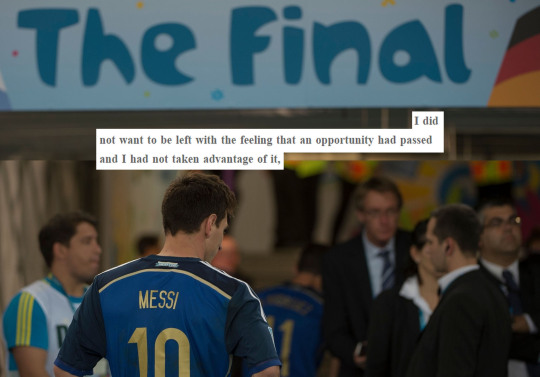
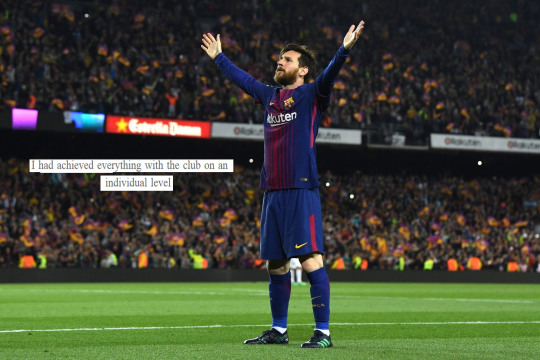
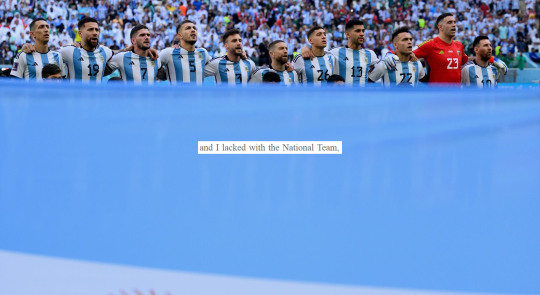


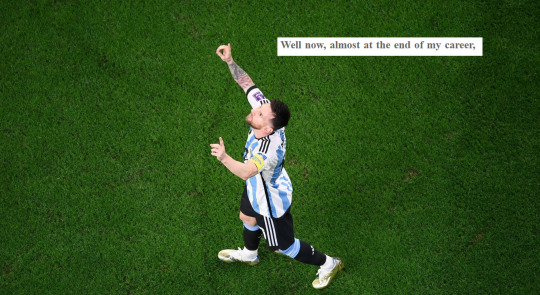

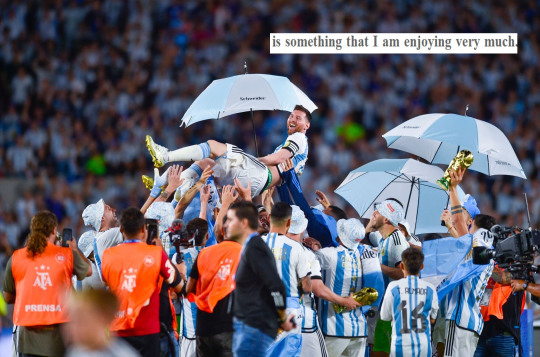
feliz cumpleaños, rey / happy birthday, king
Quotes by Lionel Messi extracted from ALTA EN EL CIELO, and cited from here. / (1) Leo Messi disapointed in match between Germany and Argentina, corresponding to the 2014 World Cup final, played at the Maracana Stadium, July 13, 2014. (Photo by Urbanandsport/NurPhoto) / (2) Lionel Messi of Barcelona celebrates after scoring his sides second goal during the La Liga match between Barcelona and Real Madrid at Camp Nou on May 6, 2018 in Barcelona, Spain. (Photo by David Ramos / (3) Team Argentina with Lionel Messi (R) of Argentina sing their national anthem prior to the FIFA World Cup Qatar 2022 Group C match between Argentina and Saudi Arabia at Lusail Stadium on November 22, 2022 in Lusail City, Qatar. (Photo by Matthias Hangst) / (4) Lionel Messi of Argentina celebrates with The FIFA World Cup Qatar 2022 Winner's Trophy after winning the FIFA World Cup on an open top bus outside the stadium during the FIFA World Cup Qatar 2022 Final match between Argentina and France at Lusail Stadium on December 18, 2022 in Lusail City, Qatar. (Photo by Michael Regan) / (5) Lionel Messi of Argentina reacts during the FIFA World Cup Qatar 2022 semi final match between Argentina and Croatia at Lusail Stadium on December 13, 2022 in Lusail City, Qatar. (Photo by Richard Heathcote) / (6) Lionel Messi of Argentina celebrates after scoring the team's first goal during the FIFA World Cup Qatar 2022 Round of 16 match between Argentina and Australia at Ahmad Bin Ali Stadium on December 03, 2022 in Doha, Qatar. (Photo by Laurence Griffiths) / (7) Lionel Messi (C) of Argentina celebrates with teammates after an international friendly between Argentina and Panama at Estadio Mas Monumental Antonio Vespucio Liberti on March 23, 2023 in Buenos Aires, Argentina. (Photo by Jam Media)
60 notes
·
View notes
Text

FULL THREAD about the legendary AFA's Truco Tournament

It is well known, the players of the Argentina national team spent many years playing this truco game when they were enlisted in concentration camps. I tried to trace the history of this tradition, and these are the results.



Trivia: Messi lent 2 of his MOTM trophies to be used as a prop when the winner of the 2014 Truco Tournament, Martin Demichelis and Maxi Rodrigues, took their commemorative shot.

A year later, it's Otamendi & Javi Pastore's turn to win the tournament.

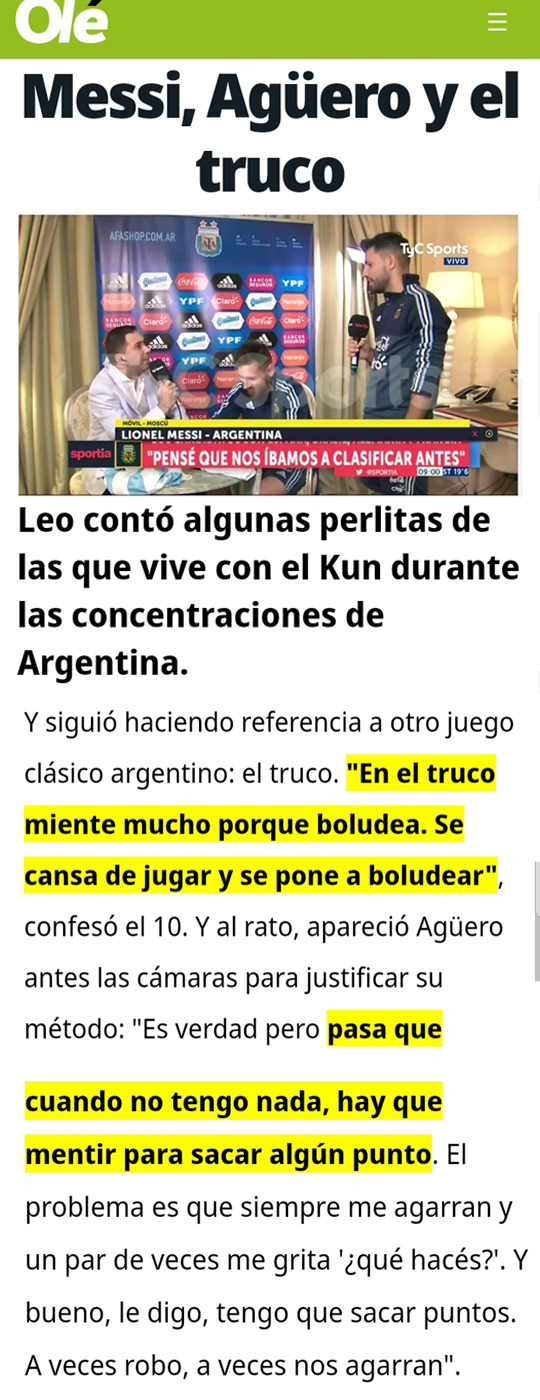
Kun & Messi in 2017.

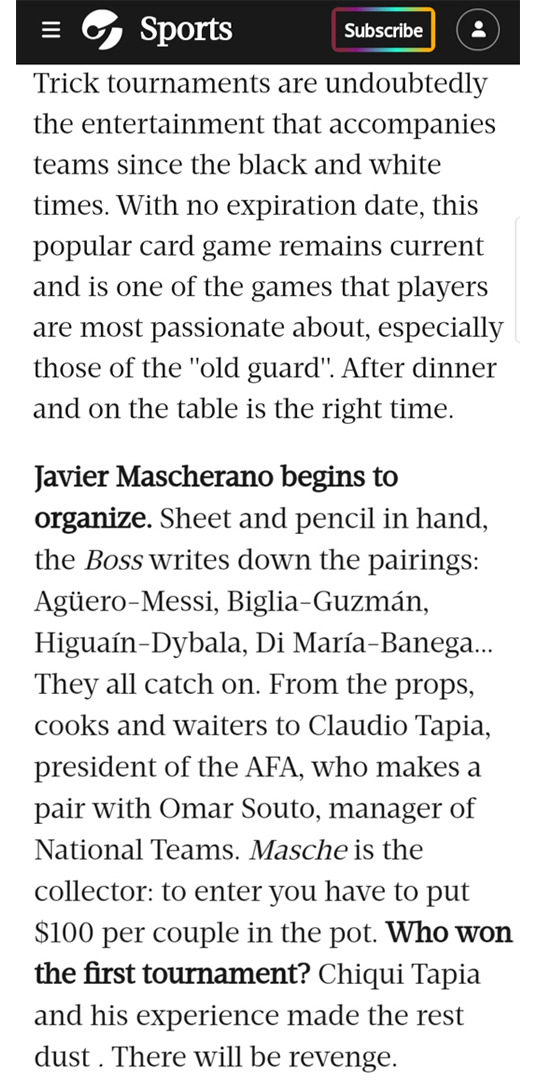
The AFA pres won the 2018's truco tournament.
And now fast forward to their 2021 Copa America Journey. With the new coach and youngsters joining the Old Guards, the Truco Torneo tradition still lives on.


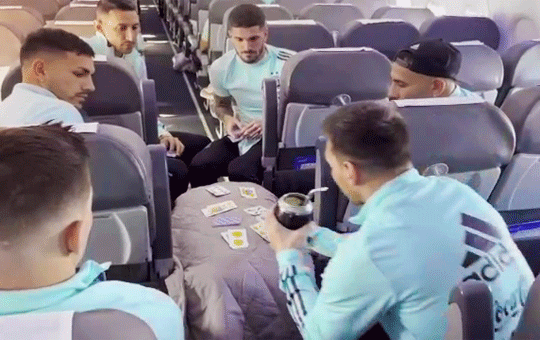

This marked the first time Messi had not partnered with his long-time best friend/forever roommate Kun, and eventually, the new trio consisting of Messi-Rodri-Lea won the tournament.

Last, the most recent tournament took place in Doha, Qatar. We got to see who was in charge of it (De Paul, Paredes), who teamed with whom, and who wasn't participating (Aimar, El Huevo, and German Pezzela).
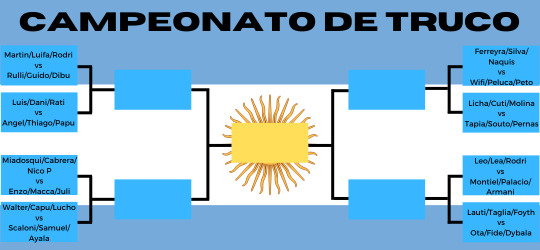
The weird thing is, I found several articles that talked about different results about who won the torneo. Some said Tapia won again with Leo becoming the runner-up, others said Tapia won and the runner-up was another AFA's staff, and I too found people who were hyped up about Juli winning the tournament.
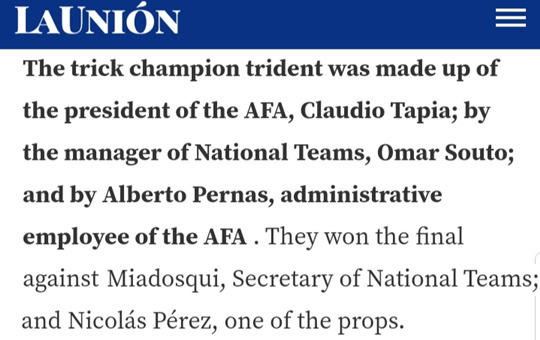


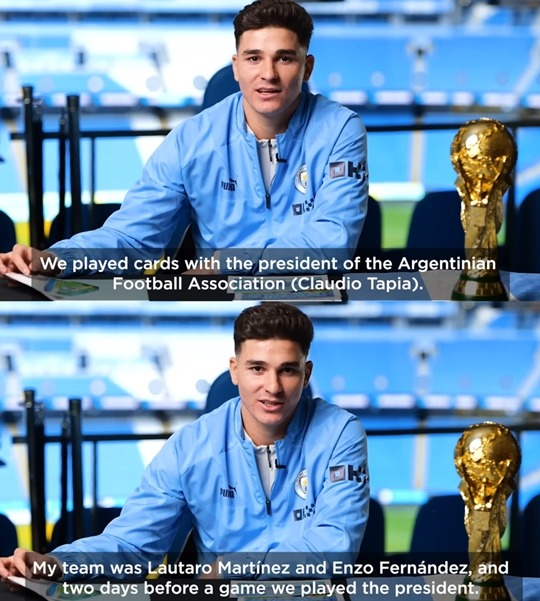
Someone on Twitter made a thread about the same topic (Truco Torneo) and from her post, we get to know that Di Maria denied this rumor about Juli.

Thanks to Taglia and Lauti who shared another inside story about the tournament. In their version, after Di Maria-Dybala-Ota team beat them, the trio then beat the Leo-Lea-Rodri team and based on the bracket maybe they (Di Maria-Dybala-Ota) were finally beaten by Chiqui Tapia's team.

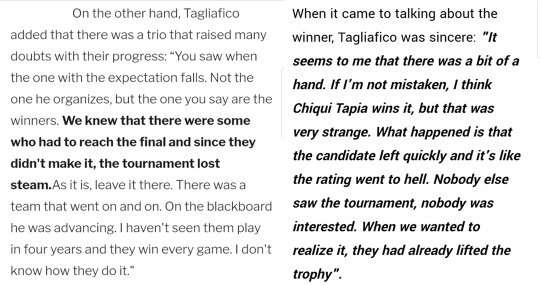
Taglia mentioned about the tournament kinda 'lost its sparks' once the favorite team lost. It seems fitting to the one Rodri said as per this OP's post. (Or it could also maybe they wasn't in the mood after the loss against Saudi Arabia).
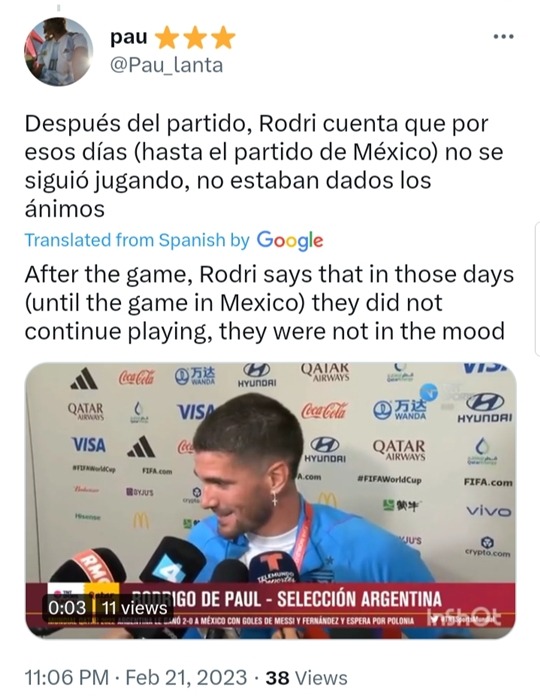
Well, we're lucky that the topic of this confusing torneo is being mentioned during El Kun's legendary Twitch Stream, although it isn't very clear at all since no one mentioned the opponent who challenged Messi's team.
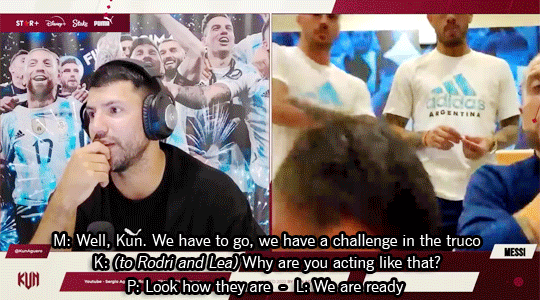


++ Torneo de Truco UPDATE
According to this recent clip, Lea did admit Ota-Di Maria-Dybala team beat his team and said the winner from the torneo was a team consisting of a manager, utility staff, and a goalkeeper coach.
...
One thing for sure is, 3 of the known loser teams have something to be blamed for. Lauti blamed Foyth, Lea called for the injustice, and then Cuti and Licha joined forces in slandering Molina's truco skill right under his Insta post.
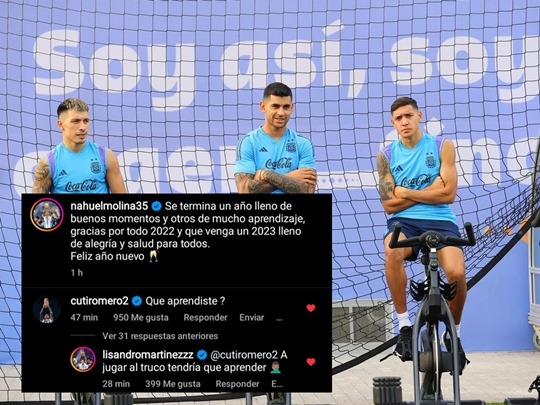

I hope the upcoming docu will reveal the real winner of the 2022 Truco Torneo.
==END OF THREAD==
#La Scaloneta#Seleccion Argentina#Argentina NT#Lionel Messi#Rodrigo De Paul#Sergio Aguero#Leandro Paredes#Nicolas Otamendi#Lisandro Martinez#Cuti Romero#Nahuel Molina#Dibu Martinez#Lautaro Martinez#Nicolas Tagliafico#Angel Di Maria#Paulo Dybala#Papu Gomez#Gio Lo Celso#Gero Rulli#Julian Alvarez#Gonzalo Montiel#Campeonato de Truco#Torneo de Truco#Copa America 2021#World Cup 2022#WC 2022
80 notes
·
View notes
Text
Three months ago, Hamas launched an unprecedented attack on Israel, which swiftly responded with an operation to eradicate the militant group. So far, around 1,200 Israelis and an estimated more than 23,000 Palestinians have died, with many more injured. Amid calls for a cease-fire, many observers are speculating what a “day after” might look like in the Gaza Strip.
Whether or not Hamas can be destroyed is a matter of considerable debate. Regardless, Israel and the United States—its most important ally—have insisted that the group can have no role in Gaza’s future administration. Instead, both have proposed the establishment of a multinational force that would include a role for Arab states—including those in the Persian Gulf. This means that Gaza could become a hot spot for geopolitical rivalries between Qatar, Saudi Arabia, and the United Arab Emirates.
Qatar is at the center of this conflict. Its capital, Doha, has hosted and financially bolstered Hamas’s political wing since 2012, when it relocated from Damascus—providing Gaza with much-needed humanitarian assistance. Qatar’s support for Hamas is part of a broader geopolitical strategy to back Islamist groups, particularly those associated with the Muslim Brotherhood, along with allies Iran and Turkey. This counterbalances Qatar’s regional rivals, Saudi Arabia and the UAE.
The small Gulf sheikhdom fashions itself something of a regional diplomat—and views diplomacy as a way to protect itself in a turbulent neighborhood. Since its traumatic 2017-to-2021 blockade, this has proved effective: Qatar moderated high-stakes talks like those between the United States and Taliban in 2020. It also secured the release of U.S. prisoners held in Iran in 2023.
The United States had previously requested that Qatar open a line of communication with Hamas in 2006 after the group’s legislative victory in the Palestinian territories, which preceded its 2007 takeover of Gaza and the Israeli blockade that followed. Since then, Doha—which does not have official relations with Israel—has actively mediated between Hamas and Israel on at least three occasions: in 2015, 2018, and 2021.
This time, Qatar is hoping to secure the release of remaining hostages held by Hamas—most of them Israeli—in exchange for a cease-fire or a humanitarian pause. From Nov. 24 to Dec. 1, 2023, ongoing talks resulted in the release of 110 hostages from Gaza and 240 Palestinian prisoners from Israel.
Qatar may go on to support nonmilitant members of the Muslim Brotherhood in Gaza after the war. (These could include members of Hamas’s political—rather than military—wing.) Doing so would satisfy U.S. and Israeli calls for Gaza to be rid of Hamas while also helping Doha to maintain its alliances with Turkey and, to a lesser extent, Iran—countering the influence of the UAE and Saudi Arabia.
Saudi Arabia has long competed with Iran for Islamic and regional leadership. Ever since the late Saudi King Abdullah launched what he called the Arab Peace Initiative in 2002, Riyadh has also supported the Arab-Israeli peace process. While Tehran—and Doha—financially and militarily back Hamas, Riyadh supports the Palestinian Authority (PA) and might wish to install the PA—which partially governs the West Bank—in postwar Gaza.
However, this could be difficult to implement. While U.S. President Joe Biden has expressed support for a post-Hamas Gaza under what he calls “a revitalized Palestinian Authority,” Israel remains opposed to any PA rule in the territory. What’s more, the PA, which many view as a proxy of Israeli occupation, is reviled by Palestinians—while Hamas’s popularity has soared. For PA rule in Gaza to be possible, Riyadh and Washington would need to do the difficult task of identifying a leader who is both accepted by Israel but also popular enough among Palestinians to dampen Hamas’s—and Iran’s—pull.
One potential candidate is former PA Prime Minister Salam Fayyad. Fayyad, a pragmatic leader, received support from the United States and Saudi Arabia during his tenure from 2007 to 2013. He also held talks with Hamas in 2021 in an unsuccessful attempt to form a national Palestinian unity government. In the past, Fayyad has suggested including Hamas under the umbrella of the Palestine Liberation Organization. While Fayyad has not commented publicly about the possibility of leading Gaza now, Saudi media reported in early January that his name has been mentioned by international diplomats in private discussions on the matter.
Before Oct. 7, Israel and Saudi Arabia had seemed to be moving toward normalization. The Biden administration had tentatively agreed to ambitious requests from Crown Prince Mohammed bin Salman, including a NATO-style security pact, access to advanced weaponry, and a civilian nuclear program. The crown prince told U.S. Secretary of State Antony Blinken last week that normalization was still in the cards after the war ends—provided that there is also a road map to Palestinian statehood.
Saudi leverage in normalization talks might unsettle the UAE. Though the two countries are ostensibly allies—especially opposite Qatar and the Muslim Brotherhood—they have stepped up their geopolitical competition in recent years in their respective quests to become the preeminent Gulf power. Both states have vied for regional dominance in the wars in Yemen and Sudan. The Arab-Israeli peace process in general—and discussions over Gaza’s future—could escalate this rivalry further.
Abu Dhabi seeks to wield a moderating influence on the war while safeguarding its own regional interests. In addition to condemning Israel’s attacks on Gazan hospitals, the UAE has been proactive in getting aid into the enclave, particularly at the United Nations. That is in part because the UAE, which balances relations between major powers such as Russia and the United States, has expansionist ambitions. In addition to Yemen and Sudan, Abu Dhabi also backs proxies in conflicts in the Horn of Africa and Libya.
The UAE’s 2020 normalization of relations with Israel was another such strategic move. Yet the country remains cautious of potential shifts in regional power dynamics, and particularly the prospect of Saudi-Israeli normalization. Emirati détente was, in part, an attempt to become the preeminent Arab power that can effect change on Palestine, wrestling that mantle away from Saudi Arabia. If Riyadh normalizes with Israel, it will be able to reclaim the Palestinian file.
Abu Dhabi may be considering Mohammed Dahlan to manage Gaza within the framework of Biden’s “revitalized” PA. Dahlan, a prominent former leader of the PA’s leading Fatah party and a native of Gaza, was once its security chief. However, Dahlan is now despised in Gaza because he spent years battling Hamas. In the eyes of many Gazans, he is no better than an Israeli occupier.
Dahlan has lived in exile in Abu Dhabi since 2011 after allegations of involvement in financial corruption and the assassination of Yasser Arafat, the leader of the Palestinian Liberation Organization. He is thought to have influenced and mediated Israeli-UAE normalization. Although the former Fatah leader has publicly rejected playing a role in a post-Hamas Gaza, Dahlan has also hinted that he is open to leading Palestinian politics in the future. This would bring strategic dividends for the UAE.
Dahlan maintains a strong relationship with Egypt, one of the two neighboring countries with official ties to Israel. The other is Jordan. Both must be included in any international diplomatic discussion over Gaza’s future—and could find themselves pulled into Gulf rivalries.
Jordan, which borders the West Bank and occupied the territory from 1948 to 1967, is home to a large Palestinian refugee population. Amman’s 1994 peace treaty with Israel recognizes the Hashemite monarchy’s custodianship of Islamic and Christian holy sites in Jerusalem—providing the country with an image of regional prestige, leadership, and religious significance. And in 1979, Egypt, the former occupier of Gaza, became the first Arab country to normalize ties with Israel. Ever since, it has aimed to balance its strategic relationship with Israel with popular support for the Palestinians and the need to maintain stability along its borders.
With most Gazans barred from Israel, Egypt’s Rafah border crossing is their main exit route. The border area also harbors Hamas’s smuggling tunnels. During this war, Cairo has helped control the Rafah crossing and shared intelligence with Israel, while President Abdel Fattah al-Sisi has attempted to position himself as a mediator by hosting an international summit. Jordan has similarly convened U.S. and Arab leaders.
But both countries suffer from vulnerabilities that could be exploited by Gulf powers eager to play a leading role in post-Hamas Gaza. They are much poorer than their Gulf counterparts, and their respective economies are in dire states—fueling popular anger even in repressive political environments.
Amman has received relief aid from Gulf Cooperation Council (GCC) nations since 2018 and has become especially dependent on support from the group due to COVID-19 pandemic-induced pressures. Egypt was struggling economically before the pandemic and the Russia-Ukraine war, but these crises—and their impact on food and fuel prices—have only made things worse. Sisi is under more scrutiny than ever.
In Egypt, Qatar could wield leverage by urging the government to ease pressure on the Muslim Brotherhood, which won Egypt’s first—and only—democratic election in 2012 and was subsequently labeled a terrorist organization after Sisi’s military took over in a 2013 coup. Riyadh and Abu Dhabi could exert sway Egypt to impact the wars in Sudan, Libya, and in Yemen.
Influence over Jordan would grant Gulf countries access to—and possible control over—the West Bank and East Jerusalem. National Defense University’s Michael Sharnoff argued in Foreign Policy in 2021 that Saudi Arabia wished to displace Jordan as the custodian of Jerusalem’s holy sites. Saudi Arabia’s demand to get this distinction would strengthen Riyadh’s hand in normalization talks with Israel and boost Riyadh’s image of being at the forefront of Islamic and Arab leadership—adding the Al-Aqsa Mosque (Islam’s third-holiest site) to the kingdom’s custodianship of Mecca and Medina (the first two).
Expanded Gulf influence over Jordan and Egypt could prove detrimental to Palestinians’ already fragile existence—and to the increasingly unrealistic two-state solution—by opening up new schisms in Palestinian society. It would also create a quagmire for the governments in Amman and Cairo. Being affiliated with a GCC state that helps displace Hamas in Gaza could bring much needed financial aid at the risk of alienating constituencies that are increasingly supportive of the militant group.
Intra-Gulf competition in Gaza has already begun. Among other actions, Qatar hosted three-way negotiations with the United States, Hamas, and Israel to allow for temporary pauses in fighting and provisions of humanitarian aid. Saudi Arabia was quick to bring forward its own initiatives, hosting a summit of major regional actors and Muslim-majority countries, such as Iran and Turkey, and announcing Chinese-brokered talks for ending the war. An Israeli start-up signed an agreement with the UAE to set up a land bridge to transfer goods from Dubai through Saudi Arabia and Jordan to Israel’s ports following a slate of Houthi attacks on Israeli cargo in the Red Sea.
Israel, the United States, and many Arab leaders are united in wanting to see Hamas’s demise. But in getting rid of one problem, others may arise. The Israel-Hamas war could intensify the growing rivalry among Gulf states—and one source of escalating regional tension may give way to another.
11 notes
·
View notes
Text

Rafale or Eurofighter? Saudi Arabia can follow Qatar and buy both
Fernando Valduga By Fernando Valduga 01/20/2024 - 12:08 in Military
Will Riyadh decide to end negotiations for 54 Rafales now that Germany has suspended the ban on the 2018 agreement for 48 Eurofighters from Great Britain? Or can you follow in the footsteps of your much smaller neighbor, Qatar, and acquire both?
The German government's recent decision to suspend the export ban on Eurofighter Typhoons to Saudi Arabia may impact Riyadh's recent decision to negotiate a potential acquisition of Dassault Rafale fighters from France.
The last move would result in the Royal Saudi Air Force operating three different types of 4.5 generation fighters from three countries. The acquisition of different types of advanced fighters would present the kingdom with certain challenges, but also some advantages.
Qatar only had a modest air force when Saudi Arabia and the United Arab Emirates blocked it in 2017. Since then, Doha has acquired a formidable fleet of the most advanced 4.5 generation jets in the world.



The current fleet of Qatari fighters is composed of F-15QAs, Rafales and Eurofighters.
In less than a decade, the richest country in the world ordered 36 F-15QA (Qatar Advanced), 36 Rafales and 24 Eurofighters, a truly manic accumulation for a country with only 313,000 citizens.
Qatar is considering ordering 24 more Rafales, which would raise the total number of Qatari Rafales to an impressive 60.
Another order from Rafale would also indicate that Qatar prefers Rafale much more than Eurofighter, since it would have bought twice as much.
The Middle East has been profitable for Dassault in recent years. Since selling its first 24 Rafales to Egypt in 2015, the first foreign order of the fighter, France signed agreements with Qatar and the record-record $19 billion agreement in December 2021 with the United Arab Emirates for 80 Rafale F4 fighters. A Saudi sale would only continue this trend of Rafale to guarantee bigger business than the Eurofighter in this arms market.
Saudi Arabia ordered 72 Eurofighters from Great Britain in 2007. Over the decades, the kingdom consistently maintained a fleet of American and British warplanes and never bought French fighters.

Eurofighters from Saudi Arabia. (Photo: Laurent ERRERA via Wikimedia Commons)
Riyadh's decision to negotiate with Paris on a potential agreement with Rafale at the end of 2023 could have been motivated mainly by Berlin's reluctance to suspend the Eurofighter ban.
Demonstrating leverage and alternative options in arms business is certainly nothing new. When the Carter administration decided to sell F-15 to Saudi Arabia for the first time in the late 1970s, there was significant opposition in Washington. In response, Saudi Arabia did not hesitate to enter into negotiations for the main French fighter of the time, the Mirage F1, to show the US that it had viable alternatives.
What will be interesting to see in the coming weeks and months is whether Riyadh will continue to negotiate this agreement with Rafale. This could happen for several reasons.
The acquisition of 54 Rafales and the new batch of 48 Eurofighters would give Saudi Arabia 102 new jets capable of the 4.5 generation. It would also strengthen its fleet of fighters at a time when the United Arab Emirates and Qatar are making considerable acquisitions. And it would be more than equivalent to the comparatively modest two dozen Su-35 Flanker fighters that Iran hopes to receive from Russia soon.
According to an Iranian journalist, Tehran ordered and paid a total of 50 Su-35 before Russia's large-scale invasion of Ukraine in February 2022. Even if it receives this number of Flankers, and this is a big if, the Royal Saudi Air Force would still have a larger and more advanced fleet.
Having three types of fighters could represent significant technical challenges and the extensive training needed for Saudi pilots to master a new fighter. At the same time, all three types are built in the West and are compatible in many respects. Incorporating French Rafales into an air force composed of American and British aircraft will undoubtedly be much simpler than introducing Russian or Chinese fighters.
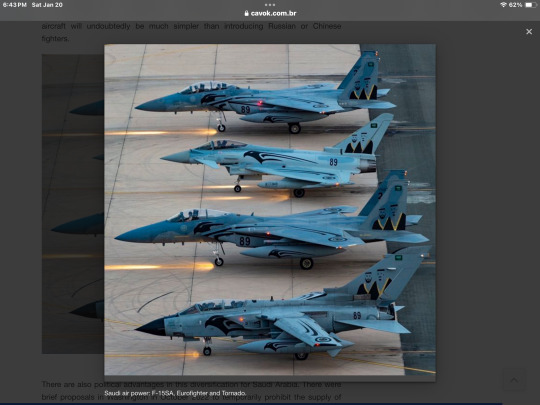
Saudi air power: F-15SA, Eurofighter and Tornado.
There are also political advantages in this diversification for Saudi Arabia. There were brief proposals in Washington in October 2022 to temporarily prohibit the supply of American weapons to the kingdom. At the time, analysts observed that the Saudi Air Force could at least depend on its considerable fleet of Eurofighters if any potential embargo impacted the operability of its sophisticated American F-15SA aircraft.
Greater diversification with Rafales would substantially limit the effect of an embargo of any of these three fighters. For these reasons, Riyadh may not leave the Rafale negotiations and, ultimately, may even acquire its first French fighters.
Source: Forbes
Tags: Military AviationDassault RafaleEurofighter TyphoonRSAF - Royal Saudi Air Force/Royal Saudi Air Force
Sharing
tweet
Fernando Valduga
Fernando Valduga
Aviation photographer and pilot since 1992, he has participated in several events and air operations, such as Cruzex, AirVenture, Dayton Airshow and FIDAE. He has works published in specialized aviation magazines in Brazil and abroad. He uses Canon equipment during his photographic work in the world of aviation.
Related news
AERONAUTICAL ACCIDENTS
Ellsworth Air Base still closed 15 days after B-1B accident
20/01/2024 - 11:42
After 40 years of service, the two-seater TU-2S Dragon Lady was deactivated on January 11, 2024. (Photo: U.S. Air Force/Beale Air Base)
MILITARY
USAF retears another TU-2S Dragon Lady
19/01/2024 - 23:13
The F-35's ALIS system should soon be replaced by a new cloud-based platform.
INCIDENTS
Stray flashlight sucked by F-35 engine caused $4 million in damage
19/01/2024 - 20:18
MILITARY
France will deliver missiles to Ukraine on a monthly basis in 2024
19/01/2024 - 16:00
MILITARY
DragonFire laser weapon system successfully tested against aerial targets
19/01/2024 - 14:00
MILITARY
'Storted' camouflage is patented by the UAC for Su-75 Checkmate
19/01/2024 - 09:00
5 notes
·
View notes
Text

Airbus A350-1000 Qatar Airways
Registration: A7-AND Type: 350-1041 Engines: 2 × RR Trent XWB-97 Serial Number: 125 First flight: Aug 27, 2018
Qatar Airways Company Q.C.S.C. operating as Qatar Airways, is the state-owned flag carrier of Qatar. Headquartered in the Qatar Airways Tower in Doha, the airline operates a hub-and-spoke network, linking over 150 international destinations across Africa, Central Asia, Europe, Far East, South Asia, Middle East, North America, South America and Oceania from its base at Hamad International Airport. Qatar Airways has been a member of the Oneworld alliance since October 2013, the first Gulf carrier to sign with one of the three airline alliances. The airline became the launch customer for the A350 XWB.
Poster for Aviators. aviaposter.com
4 notes
·
View notes
Text
Ivana Knöll, la croate qui a fait monter les températures au mondial Qatar 2022 avec ses petites tenues vestimentaires dans les stades et sur les plages de Doha. Elle a fait sensation et polémique à travers ses photos et ses vidéos. Elle est née le 16 septembre 1992, en Allemagne, d'un père et d'une mère croates. À l'âge de 7 ans, elle est allée vivre à Zagreb, en Croatie. Mannequin, finaliste de Miss Croatie en 2016 et couronnée Miss Croatie en 2018. Elle a déjà supporté la Croatie au Brésil en 2014 et en Russie en 2018. Elle a volé la vedette aux joueurs mondiaux et ébloui les Qataris dans les différents matchs de son équipe. Quoique connus pour leur rigueur vestimentaire, les photos des Qataris avec cette beauté ne cessent d'enflammer la toile. Elle a déclaré sur les restrictions vestimentaires au Qatar: ''J'étais en colère car je ne suis pas musulmane, et si nous, en Europe nous respectons le Hijab, je pense qu'ils doivent aussi respecter notre mode de vie, notre religion''. Cependant, elle a précisé par la suite que le gouvernement Qatari lui a autorisé de porter ses vêtements parce que c'est la coupe du monde et qu'elle n'avait jamais retrouvé de contraintes. Après la Finale, elle a envoyé un petit message à la Féderation Internationale de Football en déclarant: "La Fifa, vous avez donné le trophée de meilleur joueur à la mauvaise personne! Peut-être que l'Argentine a gagné mais Kylian Mbappé est le meilleur joueur!"
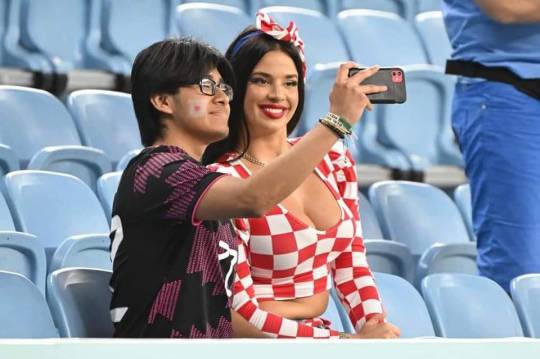
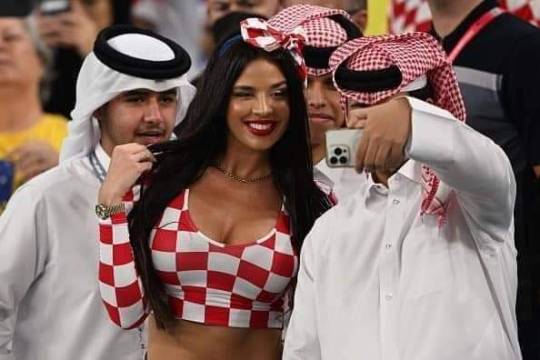


15 notes
·
View notes
Note
Seeing people get mad at Dibu for that moment of silence in the locker room and holding a baby doll with mbappe's face (💀) taped to it during the parade like??? first of all, pretty sure someone in the crowd threw that at them, second????????? they're on top of the world right now, i sincerely doubt there's any malice behind ANYTHING. leo and dibu both hugged and spoke to mbappe after the match. accounts keep posting that doll pic for reactions like?? ok post crowds chanting xenophobic bs and burning argentine falgs in france. post the establishments placing messi's psg and argentina jerseys at their door, telling customers to wipe their shoes on them on the way in. and so much more like everyone so unwilling to admit that argentina played better for most of that match and of course the 'bathrobe' discourse. a guy honestly went around doha asking actual argentines what they thought of it and everyone said they don't mind and it's obviously a sign of respect and honoring messi/argentina. is it only disrespectful and 'classless' when they're not european? if they were, i'd bet anything they'd be laughing about it, calling it banter and shithousery and whatever else. give me a break honestly.
that's way longer than i thought, i'm sorry 😭😭. sincerely though, ur egyptian bestie 👋
HEY EGYPTIAN BESTIE🤩
Omg never apologize for a long message, I love hearing from you💞🤧 but you are SO RIGHT! I’m not mad at it, because like Jamie Vardy said “chat shit, get banged.” Mbappé ran his mouth and this is it coming back to haunt him🤷🏾♀️
Argentine fans are having fun with it but it’s not like Dibu made that doll💀 and remember when back in 2018 France made a song about Kanté stopping Messi and they kept singing that🤔 because I do……I remember that clearly.
Remember in 2014, when the German players were celebrating in Berlin, they were singing songs about: "This is how the gauchos walk, the gauchos walk like this," chanted the Germans, mocking the South Americans as a hunched-over, short and little people.
Then came the Germans.
"This is how the Germans walk, the Germans walk like this." Back straight. Tall. Proud.
So people truly need to get over themselves. A teenage mutant ninja turtle teddy and a doll with his face on it is truly tame compared to how Argentina have been mocked over the years😒
#and see!! I knew argentines were not upset#I saw a headline that said ‘Messi lifted the World Cup and it’s the worst moment in history’ AND THE ARTICLE WAS ABOUT THE BISHT!!?#it was literally British media#FIFA even said they had one prepared according to Hugo Lloris’s size as well - they were going to do it regardless#the racism and islamophobia is disgusting#anon
8 notes
·
View notes
Photo
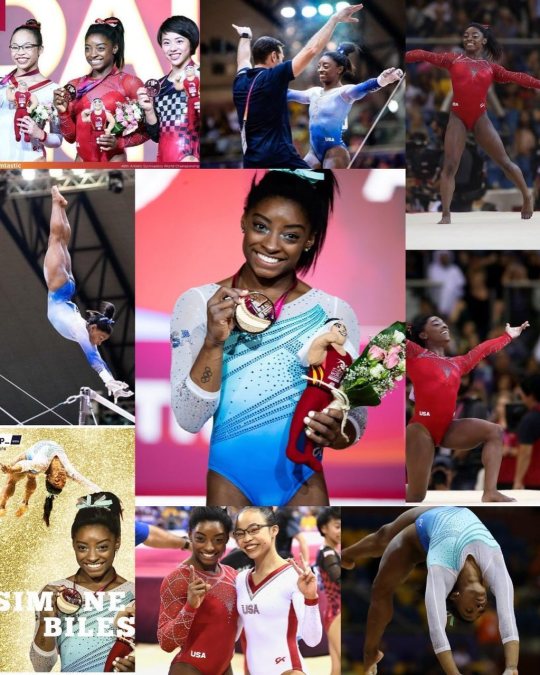
Simone Arianne Biles (born March 14, 1997) is an artistic gymnast. With a combined total of 32 Olympic and World Championship medals, she is tied as the most decorated gymnast of all time. Her seven Olympic medals tied for the most Olympic medals won by an American gymnast. She is considered one of the greatest and most dominant gymnasts of all time. At the 2016 Summer Olympics in Rio de Janeiro, she won individual gold medals in the all-around, vault, and floor; bronze on the balance beam; and gold as part of the US team, dubbed the "Final Five". At the 2020 Summer Olympics in Tokyo, she won bronze on the balance beam, as well as silver with the US team, after struggling with "the twisties", a temporary loss of air balance awareness. Her partial withdrawal, focus on safety, mental health, and perseverance was praised. She is a five-time World all-around champion (2013–2015, 2018–2019), five-time World floor exercise champion (2013–2015, 2018–2019), three-time World balance beam champion (2014–2015, 2019), two-time World vault champion (2018–2019), a seven-time US national all-around champion (2013–2016, 2018–2019, 2021), and a member of the gold medal-winning American teams at 2014, 2015, 2018, and 2019 World Artistic Gymnastics Championships. She is a three-time World silver medalist (2013 and 2014 on vault, 2018 on uneven bars) and a three-time World bronze medalist (2015 on vault, 2013 and 2018 on balance beam). She is the gymnast with the most World medals (25) and most World gold medals (19). She is the female gymnast with the most World all-around titles (5). She is the sixth woman to win an individual all-around title at both the World Championships and the Olympics, and the first gymnast since 1996 to hold both titles simultaneously. She is the tenth female gymnast and first American female gymnast to win a World medal in every event, and the first female gymnast since 1988 to win a medal in every event at a single Olympic Games or World Championships, having accomplished this feat at the 2018 World Championships in Doha. #africanhistory365 #africanexcellence #womenshistorymonth https://www.instagram.com/p/CpxNIvWLbaL/?igshid=NGJjMDIxMWI=
2 notes
·
View notes
Photo
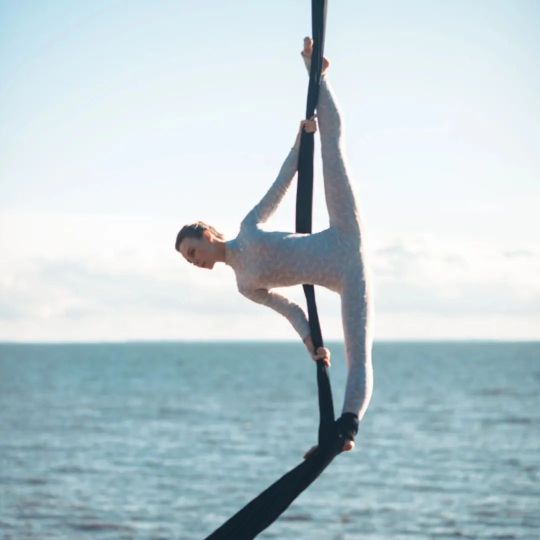
И бога можно купить... Или, по крайней мере, актера, его игравшего. К нему у меня неоднозначное отношение, собственно, как у поклонников футбола к нынешним полуфиналистам. Видимо, за деньги он будет «петь» о чем угодно, помянуя его высказывания в 2017 году... Я бы больше внимания уделила второму соведущему, который действительно украл сердечки большинства зрителей. Ганим Аль-Муфта, катарский блоггер, который покорил самую высокую вершину в Персидском заливе, занимается спортом и мечтает стать премьер-министром. Поищите, почитайте и вдохновитесь. Ему давали только 15 лет жизни, а вот ему двадцать и он посол Чемпионата мира по футболу. Это вам не Даня и «голубое лобби». Стоить отметить, что хотя бы в параде маскотов не «закенсилили» символ ЧМ 2018, проходившего в России, волка Забиваку. Надеюсь, у некоторых не сильно свербило в одном месте, когда наш талисман получал свое экранное время, еще и крупным планом. А звездой шоу (хотя бы для поклонников К-попа) стал Чон Джон Гук. Честно говоря, пришлось гуглить. И почему-то очень хочется пошутить про « Учкудук – три колодца», но это в другой стране. А певец-то из Кореи. Хотя для арабского мира звездой там был второй исполнитель, катарский певец Фахад Аль-Кубаиси. В общем, с музыкой всё немного сложно, и «звезды» встали странно, вроде и песня хорошая, но не хит. Нет в ней того драйва под стать мероприятию. За сим и распрощаемся. #aerialist @milyaykina #photography @phototania (at Doha Corniche) https://www.instagram.com/p/CmAWNDOsDtV/?igshid=NGJjMDIxMWI=
5 notes
·
View notes
Text

The Pearl Island (Arabic: جزيرة اللؤلؤة, romanized: jazirat alluwlua) in Doha, Qatar, is an artificial island with an area of nearly four square kilometers. It is the first land in Qatar to be available for freehold ownership by foreign nationals. As of 2018, there were 27,000 residents.
0 notes